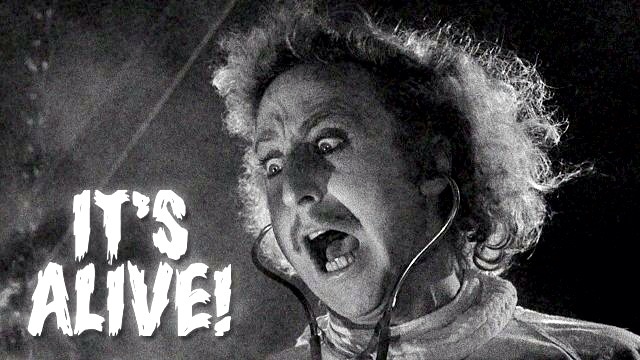-
Welcome to rpgcodex.net, a site dedicated to discussing computer based role-playing games in a free and open fashion. We're less strict than other forums, but please refer to the rules.
"This message is awaiting moderator approval": All new users must pass through our moderation queue before they will be able to post normally. Until your account has "passed" your posts will only be visible to yourself (and moderators) until they are approved. Give us a week to get around to approving / deleting / ignoring your mundane opinion on crap before hassling us about it. Once you have passed the moderation period (think of it as a test), you will be able to post normally, just like all the other retards.
You are using an out of date browser. It may not display this or other websites correctly.
You should upgrade or use an alternative browser.
You should upgrade or use an alternative browser.
George Ziets opening a new RPG studio - Digimancy Entertainment
- Thread starter Infinitron
- Start date

- Joined
- May 29, 2010
- Messages
- 37,338
Of course.Do you just mean who he was sleeping with
- Joined
- Oct 21, 2002
- Messages
- 17,068

I completely missed this. I almost spit out water!
Narrative lead, huh... Not just a contributing role, but an actual lead. Interesting.
I hope Zeits still has the final call on narrative and writing, being a studio head or whatever.
- Joined
- Oct 21, 2002
- Messages
- 17,068

Mr Mitsoda out, Ms Mitsoda in.They are co-developing VTMB2 with The Chinese room.
scytheavatar
Scholar
- Joined
- Sep 22, 2016
- Messages
- 778
Just wait and see.
ARPG doesn't mean it'll be shit, but doesn't mean it won't be either.
just is probably right anyways.
ARPG means that it almost certainly will be shit, cause getting the "A" part right is a shit ton of work. And almost will mean less time and effort that can be spent on the "RPG" part.
rusty_shackleford
Arcane
- Joined
- Jan 14, 2018
- Messages
- 50,754

why
- Joined
- Jun 4, 2010
- Messages
- 3,528


Ah yes, a first person action game. The one genre to rule them all and forever bind them.If it wasn't obvious from the previous job postings that revealed their new game is first-person open world AAA game.
It is an action game. https://digimancygames.com/jobs#lead-level-designer
We are seeking an experienced Lead Level Designer with proven expertise in leading teams in building engaging levels for first-person, action-oriented AAA games.
Not interested.

- Joined
- May 29, 2010
- Messages
- 37,338
Digimancy isn't remotely AAA, they're just being a support studio for some bigger developer.Ah yes, a first person action game. The one genre to rule them all and forever bind them.
Not interested.
- Joined
- Jan 28, 2011
- Messages
- 100,710















From July:
https://digimancygames.com/news/interview-with-adam-heine
Digimancy Team Member Profile: Interview with Senior Narrative Designer Adam Heine
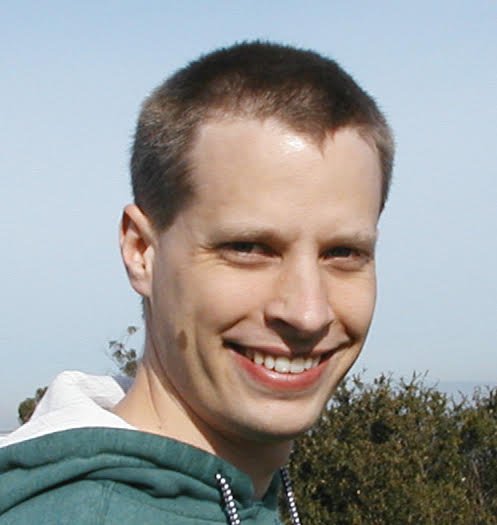
How did you discover writing as a passion for yourself?
I've always loved telling stories, and for me, writing is just one means of telling those stories. Even as a kid, I would write books, design Choose Your Own Adventures, tell make-believe stories with friends (or action figures), and plan tabletop campaigns in Heroes Unlimited or TMNT and Other Strangeness (only because I didn't find D&D until college).
I didn't take writing seriously until some time in high school, when I tried my hand at full novels. This phase didn't last long though. I started to believe that everything I was writing was super derivative, and so I stopped writing for years.
But I never lost the desire to tell stories. I kept running tabletop campaigns, designing simple games I could program myself, and even drawing comics. And one day, I learned that it is basically impossible to create something that has never been done before. The goal of creation is not to be truly original but to create something that is truly you.
And so, I rediscovered writing, but this time without the worry that I was copying my favorite works. Copying is an okay place to start, I decided, especially when you're still learning. You just need to keep going beyond that, combining multiple inspirations from a variety of sources until you've created something special and uniquely you. The world doesn't need "new" stories. It needs yours.
How / when did you realize you could take that passion and apply it toward a career?
My game dev career is a combination of two paths. I've talked about how I got into writing. Ultimately, that led to a few published short stories and novellas, and I'm still writing novels when I have time (which is not a lot but not zero either).
But writing isn't how I got into games. I fell in love with game design through the NES (and to a lesser extent, old Mac and Apple IIe games), but back then, the only career paths into games were through art or programming. I didn't consider myself an artist, so I dove headlong into programming. In 1999, I joined Black Isle Studios as a scripter but quickly steered my career toward game design.
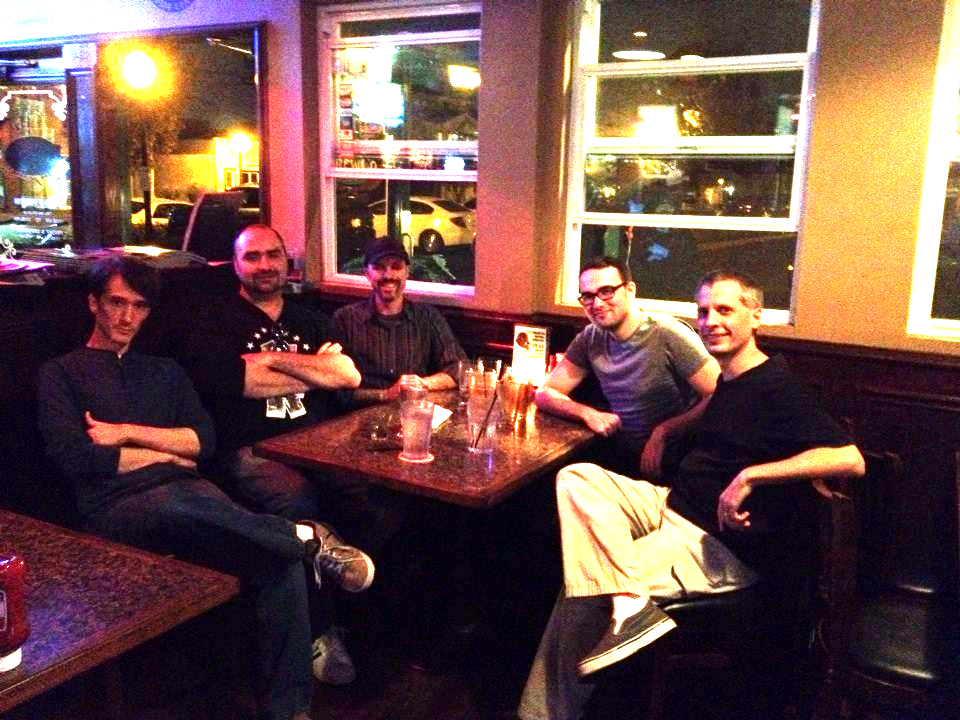
Dinner with a friend and some inXile folks during Torment: George Ziets, Colin McComb, and Thomas Beekers.
My real passion, though, is combining the paths of writing and systems design. My favorite areas of game design are things like world-building, narrative design, branching dialogues, interactive fiction, and fun game mechanics that enhance the narrative in different ways. Tasks like these combine the creativity of writing with the analytical nature of programming and just make every part of my brain click with joy.
The fact that I can make a career out of it is astounding (and kind of lucky). I feel like I've barely managed to piece together several jobs in order to create a freelance career that can support my family and bring me joy at the same time. I'm not even convinced it will last, but I'm supremely thankful for it while I have it. Digimancy has been an enormous blessing toward that end, because as any freelancer will tell you, a steady income is a difficult thing to find.
Could you please share with us what your writing process looks like? And what are some of the things that you do to keep yourself growing and evolving as a writer?
My process changes for every project, but there are some common threads no matter what I'm working on. I like to take long walks in which I talk to myself to think through a problem or brainstorm ideas. I make reams of TXT files to dump thoughts and ideas until I find a clear thread to tug on. And I stare at blank documents for hours on end, telling myself over and over again that the first draft doesn't need to be perfect—it just needs to exist. The self-talk only sort of helps.
As far as growing and evolving, the best ways for me are to continue writing, absorbing stories (reading of course, but visual media is great too), and seeking out and listening to feedback. Sadly, my time to write outside of games has been pretty limited lately, but I do still find time, and I hope to make more soon. As much as I love making games, there's something about crafting my own worlds and stories that I can't get away from.
One of your first game credits is as a scripter for Planescape: Torment. What was it like working on this classic computer role-playing game?
That project was a dream. None of us knew at the time, of course, that it would become a classic (and it didn't sell terribly well upon release either—its "classic" status came much later). We only knew that we loved what we were making. I read every design doc I could find on the company server. I couldn't get enough of this strange, compelling world and the mystery of who the Nameless One really was.
It was also my first project, which made it even more of a dream—a culmination of a dream, really. My job was mostly taking designers' outlines for different areas and implementing them in the game—cutscenes, boss battles, cranium rats, immortal tomb puzzles, brothel NPC pathing and barks... all of it. It sounds like it might not be very creative, but I loved it.
And it was creative. I frequently discovered that what the designers wanted to do wasn't supported by the engine, and I had to figure out clever workarounds or alternatives all the time. I gained a reputation as a kind of troubleshooter, but really, I was just trying to make the game as good as I could make it.
Much as I loved the team and the project, I left the game industry shortly after Torment's release to focus on my personal life. But the connections I made on that project were strong enough (apparently) to pull me back in several years later for Torment's spiritual successor and several gigs after that.
You worked as the Design Lead for Torment: Tides of Numenera later in your career. How did this opportunity come about for you and what was it like stepping into a Design Lead role for this production?
This project was a Godsend for me. My wife and I live in Thailand, and our primary work is taking in children with nowhere to go. But by 2011, our expenses had slowly outstripped our income. It was at exactly that time that Colin McComb, whom I'd worked with on Planescape: Torment, asked me if I wanted to work on a spiritual successor to that game. I probably would've done it for free, but I needed a paying job—or at least a chance at one.
Before and during the Kickstarter campaign, all my work was on-spec. The idea was that if the Kickstarter met its goal of $900,000, I would have a job for a few months as a writer. But the campaign turned into a record-breaking success raising over $4 million, and I was made a full designer for the length of the project. A few months later, Kevin Saunders promoted me to Design Lead (partially because that's kinda what I was already doing?).
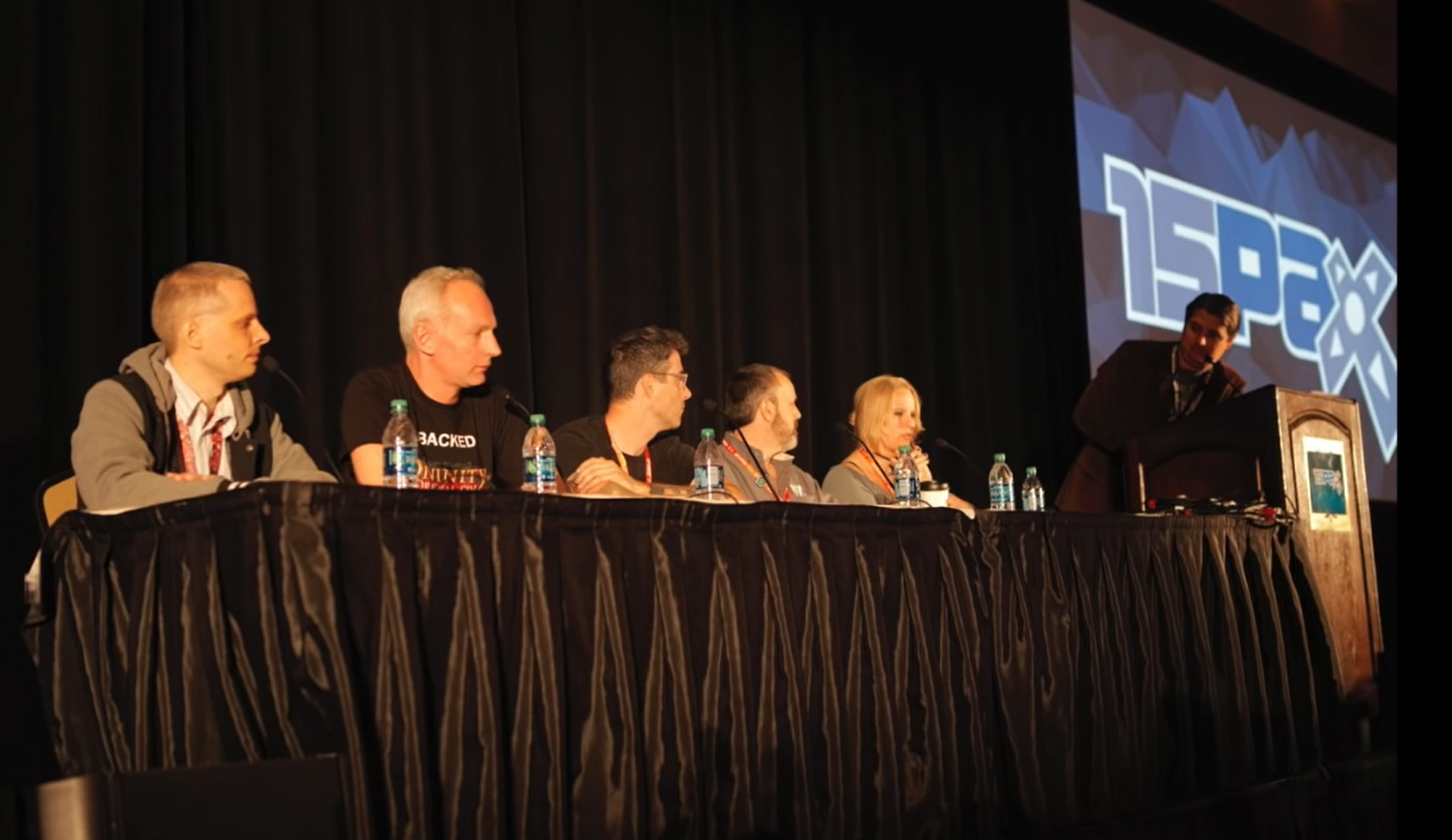
On a CRPG panel at PAX 2015, with Swen Vincke, Josh Sawyer, Mitch Gitelman, and our own Annie Vandermeer.
In those days, remote work was less common than it is today, and working from the opposite side of the world even less, so it was difficult for me to be a "lead" in the traditional sense of managing people. Most of my responsibilities included being in charge of Answers and Decisions (and documents... dear God, so many documents). It wasn't easy, but we made it work—largely with the help of Kevin and others who served as my voice in the US offices—and we ended up with a game that I'm really proud of.
Your most recent official credit was for work as a dialogue and quest writer on Remnant: From the Ashes, a huge title from Gunfire Games with 35,000+ Very Positive reviews on Steam. What was it like shifting gears and working on this third-person survival action shooter as a writer?
Working on Remnant has been a blast. On Torment, I had to attend frequent meetings, answer questions daily, and fly out to the States twice a year. But for Remnant, my work is much more freelance—they tell me what they want, then I write it up and ship it over. I have less control over the final product than I did on Torment, but (1) that's not entirely true, because my writing has often remained unchanged in the final product, and (2) this hands-off work style provides a really great work–life balance for me. On Torment, I had to stay on top of everything every day, but Remnant allowed me to focus only on my part of the work. It was refreshing in a way.
As for Remnant being an action shooter, I once told [Digimancy founder] George that I'm happy to work on any game at all. Even if something's not my favorite genre, I find what I love in the project and create something that's fun. Though in the case of Remnant, I do enjoy action shooters, and Remnant's post-apocalyptic world is exactly the kind of world I love to play in. It's pretty easy to find what I love in it.
What does a typical workday look like for you?
My workdays are a mess! So, I work from home and am also the father of many foster children—currently nine at home. Consequently, keeping any kind of schedule is a fool's errand. It's just one more reason I'm thankful for the flexible schedule Digimancy allows me to have.
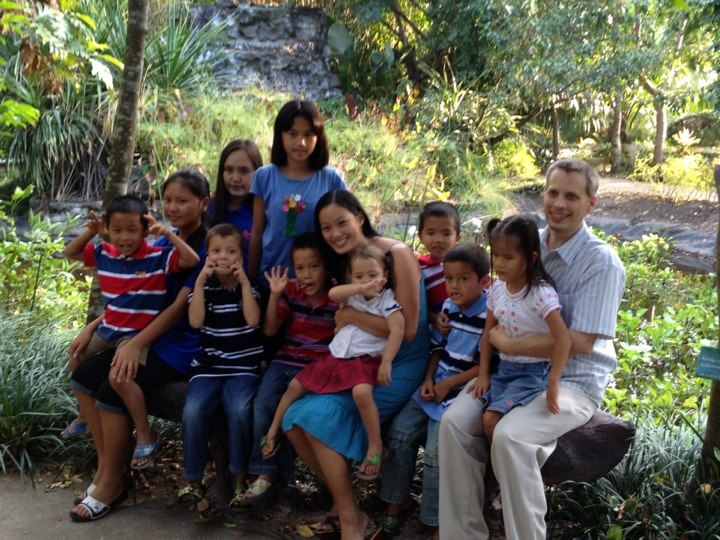
An old (but accurate) picture of my family life.
What I try to do is something like this. First thing in the morning, I wake any kids who haven't gotten up yet, feed the cat, check the news, do Wordle, and then read every communication channel I have access to. (My morning is after work hours for most of Digimancy, so I usually have a lot to catch up on.) Then I do whatever Digimancy needs me to do basically until lunch.
I'm only part-time with Digimancy (a necessity due to the aforementioned fool's errand), so I try to leave my afternoons available for any necessary parenting, errands, and other freelance work if I have it. This is when writing is supposed to happen, but for the last few months, it rarely has. At about 3:30 or so, it's time to pick up whoever's at school and be a full-time father again for a few hours and/or play video games—which is also part of fathering, if you ask me—before any Digimancy meetings I might have. (My night, of course, is Digimancy's morning, so everybody wants to talk to me again.)
It feels overly full when I put it like that, but like I said, my days are never actually that simple. One thing I have learned, however, is to guard my work–life balance amidst all of it. What that usually means is that nobody (except my family of course) gets time from me that they aren't paying for. It sounds harsh, and I struggle with guilt for it all the time, but I know from experience that it is the only sustainable way.
Could you share with us which fantasy authors shaped your own work as a writer
As a kid, I had access to a lot of J.R.R. Tolkien, C.S. Lewis, Madeleine L'Engle, Susan Cooper, and Anne McCaffrey, all of whom were hugely formative in the way I think about fantasy. (I mentioned earlier that I quit writing for a while because my writing felt super derivative? It was The Fellowship of the Ring that I had inadvertently copied.) Due in large part to Tolkien's influce, world-building has become my favorite part of the writing process, and the works of Brandon Sanderson and Orson Scott Card have been additionally instrumental in how I approach that aspect.
I could list tons of authors I enjoy—Terry Pratchett, Neil Gaiman, Gene Wolfe, Garth Nix, Holly Black, Susanna Clarke, and many more—but I can't say I write like those folks (though I would love to). I don't know if I can honestly say they shaped my work, but they certainly inform it.
Could you share with us the kind of fantasy novel you're hoping to one day write and what plans you have to start taking steps toward accomplishing that milestone?
So, I've been writing with the intent of publication for... nearly 20 years now I guess. I've had a couple of short stories published in Beneath Ceaseless Skies and Paizo's Pathfinder Tales (about air pirates and unscrupulous alchemists, respectively). I got an agent in 2011, and my historical sci-fi novella Izanami's Choice—about autonomous robots in post-Meiji Japan—was published in 2016.
My agent and I have yet to sell one of my novels, but it's a hard road, and we're still walking on it. I've got one modern fantasy novel with an editor, a co-authored Middle Grade fantasy currently with my agent, and I'm working on a draft of another fantasy novel when I can find the time and motivation. (I'm pretty much always "working on" another novel—the question is how much work I'm able to put into it at any given time.) I've also got a couple of novels in the trunk that I hope to revisit and give a face-lift to someday—one set in the world of the aforementioned Beneath Ceaseless Skies story and another in a post climate-change future where civilization basically had to start over.
I can't say what will happen to any of those stories, but I've never stopped working on them.
- Joined
- Aug 23, 2015
- Messages
- 6,237

Well I guess someone picked the concept up so it means the work all this time is not kapput. That's nice for Digimancy

I guess his kids grew out of that young age for fucking, so he got bored and decided to get a job.
- Joined
- Jan 28, 2011
- Messages
- 100,710















"Major publisher", eh? I've lost interest in the studio, but I do wonder who picked up their game idea.
Old tweet, the publisher was Paradox and the game was cancelled.
- Joined
- Jan 19, 2014
- Messages
- 14,578







Oh yeah, didn't see the July comment."Major publisher", eh? I've lost interest in the studio, but I do wonder who picked up their game idea.
Old tweet, the publisher was Paradox and the game was cancelled.
I remember.
ADULF HITLOR FAN KLUB
Arcane
There is an endless supply of little kids in Thailand that creepy Westerners can groom.I guess his kids grew out of that young age for fucking, so he got bored and decided to get a job.

A lot of small indie studio do contract work for bigger ones, or even non gaming companies. These serious games need to be made somewhere after all.How do they afford to hire and pay these people when they haven’t produced anything, it’s been awhile now.
Viata
Arcane
So still nothing?
SpaceWizardz
Liturgist
- Joined
- Sep 28, 2018
- Messages
- 1,177
Big if true:
- Joined
- Aug 23, 2015
- Messages
- 6,237

Well at least the studio survive and can use the moolah from the project for future project
Honestly Zeits should stop trying to make weird shit. Just make a normal CRPG or tacticool game with narrative element like Troubleshooter
Honestly Zeits should stop trying to make weird shit. Just make a normal CRPG or tacticool game with narrative element like Troubleshooter
This is their latest tweet. So they're not dead. Just their projects get cancelled a lot. Not their fault, I would think.







![The Year of Incline [2014] Codex 2014](/forums/smiles/campaign_tags/campaign_incline2014.png)










